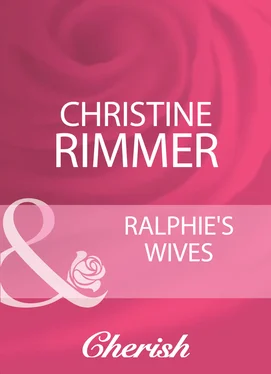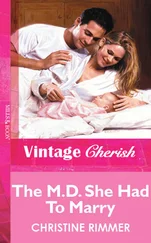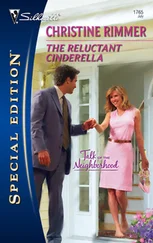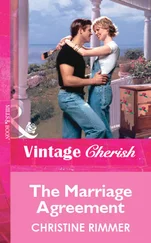“I’m on it. I’ll pick up a car this morning. A beige sedan. When I’m working, I like a full-sized car. A nice, dependable model. With a big engine. A guy never knows when he’ll need to get away fast.”
“In your case, I completely understand.” She moved back.
He took that to mean she was letting him in and stepped over the threshold directly into her living room, which was painted a buttery-yellow with white trim. The furniture was simple, Pottery Barn meets fifties retro. One of those square fifties couches, lamps that looked like spaceships, a blond wood coffee table in a kidney shape. A plain sisal rug on the hardwood floor. It was nice. Very little clutter.
“Come on back to the kitchen. I’ll see about that coffee you just had to have.” She turned to lead the way.
He didn’t follow. A framed black-and-white photograph over the television had caught his eye. He stepped a little closer.
It was an old building, two stories, stone below, clapboard above, the upper story jutting on round pillars above the lower, leaving a natural porch beneath. A sign in old-time script crowned the upper story. He read, “The Prairie Queen.”
She turned back to him. Her mouth, pinched at first, softened. “It was a music hall. An Oklahoma legend in its day. I was born there.” He waited as she decided whether to say any more, though he already knew the basic facts. Finally, she went on, “My mother and father and a bunch of their friends pooled what money they had and bought the building in the early seventies. They renovated it, doing all the work themselves, using salvaged materials. For a while, the Queen was a going concern. She drew bands from all over—some big names, too. That was where Ralphie came in. He showed up, calling himself a promoter, after the Queen had been in operation for a few months. He helped my parents and their friends book the bands. He was pretty good at it, too.”
“You said you were born in the building?” That part was news.
She hitched her chin up. “Yes, I was. There were rooms in back where everyone lived. No money for hospitals. Later, after the Queen closed down, my dad did pretty well for himself, buying old houses, fixing them up and reselling them. But in the days of the Prairie Queen, he and my mother were as broke as the rest of them. Tiff and Rose were born in the Queen, too.”
“And you three are like sisters.”
“That’s right.” Defiant. Proud. Then she shrugged. “They called themselves a commune, my parents and their friends. But the commune didn’t last. The doors closed in seventy-eight. They tore the building down about fifteen years ago. There’s a strip mall there now.”
“And you named your band after the music hall.”
She fell back a step. “Ralphie told you about the band.” Rio nodded. Her dark brows drew together. “Did he also tell you he was our manager?”
“Yeah.”
She gave him a long look and then huffed out a breath. “Well, the band had a shorter lifespan than the music hall.”
“Ralphie’s fault.”
She glared. “You want that coffee or not?” She turned away again, started walking.
“Wait,” Rio said. She stopped, but didn’t face him. He spoke to her back. “Ralphie told me. How he screwed around on you. He always said when he lost you, he lost one of the best.”
She did turn then. Slowly. “He didn’t lose me. I’m still right here.”
Rio held to his point. “You know what I’m saying. He lost you…as a woman. And he always regretted that.”
She folded her arms across her middle. Classic body language: listening, maybe. Receptive? Not in the least. “It doesn’t matter. That was a long time ago—and Ralphie was who he was.”
“So true. Just when you’d think he couldn’t make things any worse, leave it to Ralphie. He’d find a way. Take your friends. First he betrays you. And then he marries your friends, one right after the other.”
“I was long over him by then. And he loved them both.”
“Like I said. One right after the other.”
If looks could kill, he’d have been fried to a cinder. She demanded, “What are you getting at?”
“That Ralphie trusted me. Maybe you should, too.”
“I haven’t even figured out who you are yet. Yesterday you came in on a Harley. Today you’re Clark Kent. Which one’s the real you?”
“Both. Neither.”
“Thank you for clarifyin’.”
Before she could whirl away again, he said, “I was a kid when I met Ralphie. He…loved my mother and she loved him. He was the father I never had, took an interest when no one else gave a damn. Yeah, he screwed up a lot. I know what he was. I’ve always known. Where I grew up, you face the truth or you don’t last too long. But he had heart. He taught me to respect myself and how to get along. I loved him. I owe him. In spite of all the crap he put you through, I think you loved him, too. Work with me.”
She pressed those soft lips together—and let her arms drop to her sides. He was making progress. She wasn’t ready to throw in with him yet—but she wasn’t saying no anymore, either. She turned.
He didn’t try to stop her that time. Instead, he followed her to a sunny sea-blue kitchen at the back of the house, where she flung out a hand in the direction of the red chrome and Formica dinette. “Have a seat.”
He pulled out one of the red vinyl chairs and dropped into it. She served him in silence, pouring his coffee into a big yellow-green mug, setting out the sugar and a little red pitcher of milk. Then she got herself a mug, too, and sat down opposite him.
More silence. Outside, he heard a lawn mower start up. They both sipped, eyes meeting, then shifting away.
Eventually, he tried a compliment. “Nice place.”
She doled out a grudging, “Thanks.” There was more sipping. She set down her mug. “You really think you could find out what happened?”
“No promises. I could work my ass off on this and still come up blank. But it’s possible—and that it is possible is enough for me. I need to know I did everything I could.”
“Yeah,” she said, resting her forearms on the table, wrapping her hands around her mug, her expression both grim and determined. She stared down into the mug for a moment, as if looking for the answer to a question she didn’t know how to ask. Then she glanced up. “What would I have to do, if I helped you?”
“You could start with a list—everyone you know who knew Ralphie. And how they knew him. Special focus on anyone who had issues with him, anyone he cheated or messed over, anyone he owed money to.”
She tapped the mug on the table and a low sound escaped her. “That’s a long list. My own name would be on it.”
He allowed a soft chuckle. “Hell. Mine, too.”
“So I’d give you this list…”
“And we’d take it from there. You’d answer my questions. All of them, to the best of your knowledge. Provide addresses and phone numbers if you have them, so I don’t have to waste time tracking people down. Back me up, say you know me and I can be trusted, if someone wants to know why I showed up on their doorstep and started asking about things they didn’t want to go into.”
The silence stretched long again. At last, she said, “All right. I can do that.” She got up, topped off her mug and held out the pot to him.
He shoved his cup her way. “Thanks.” She gave him more and then carried the pot to the counter. When she slipped back into her seat, he said, “Tell me about Darla Jo.”
She stiffened right up on him. “I thought I was supposed to start with a list.”
“That’s right. You also agreed to answer my questions.”
She slumped in her chair, looked down at her lap, then slanted a suspicious glance up at him. “Why the big interest in Darla?”
Читать дальше












